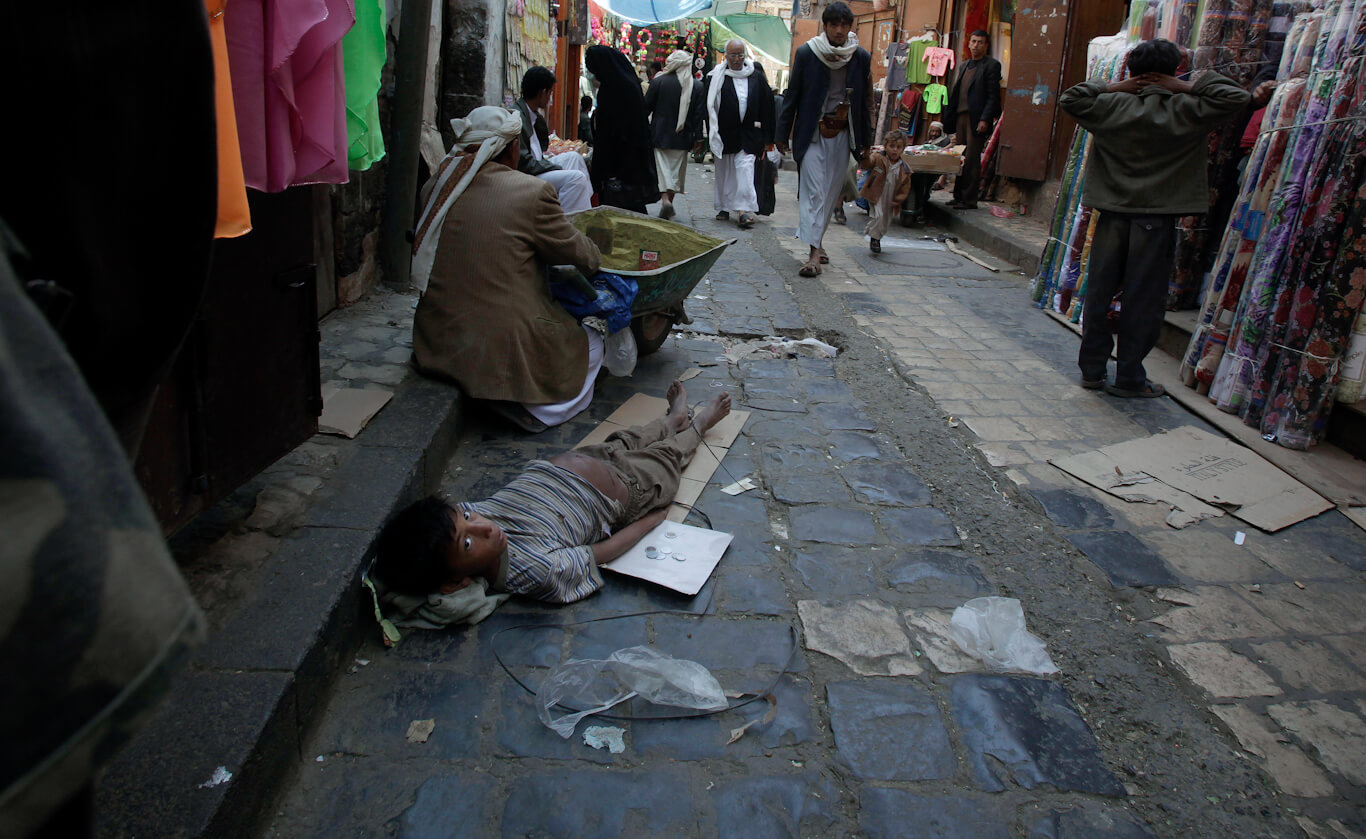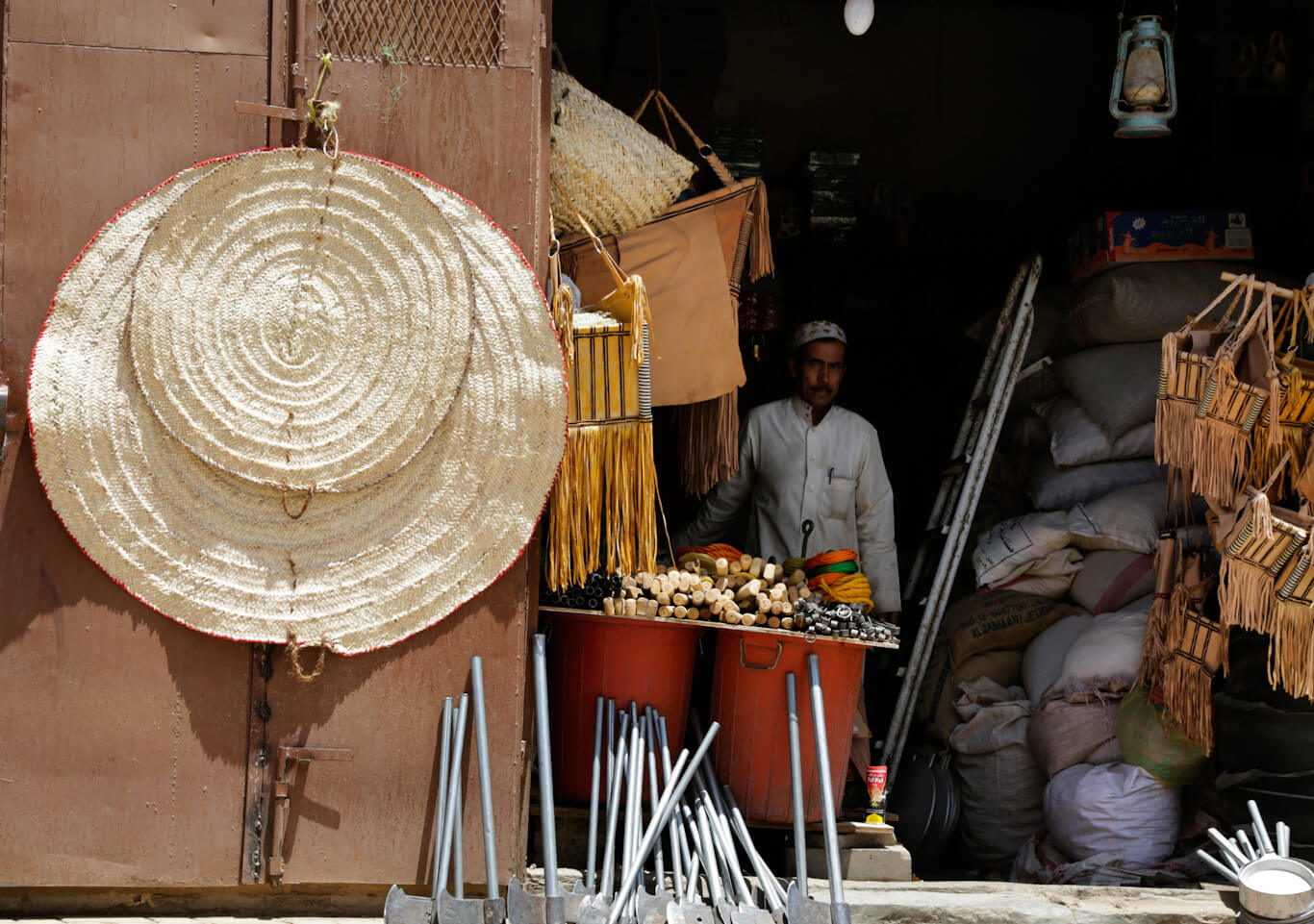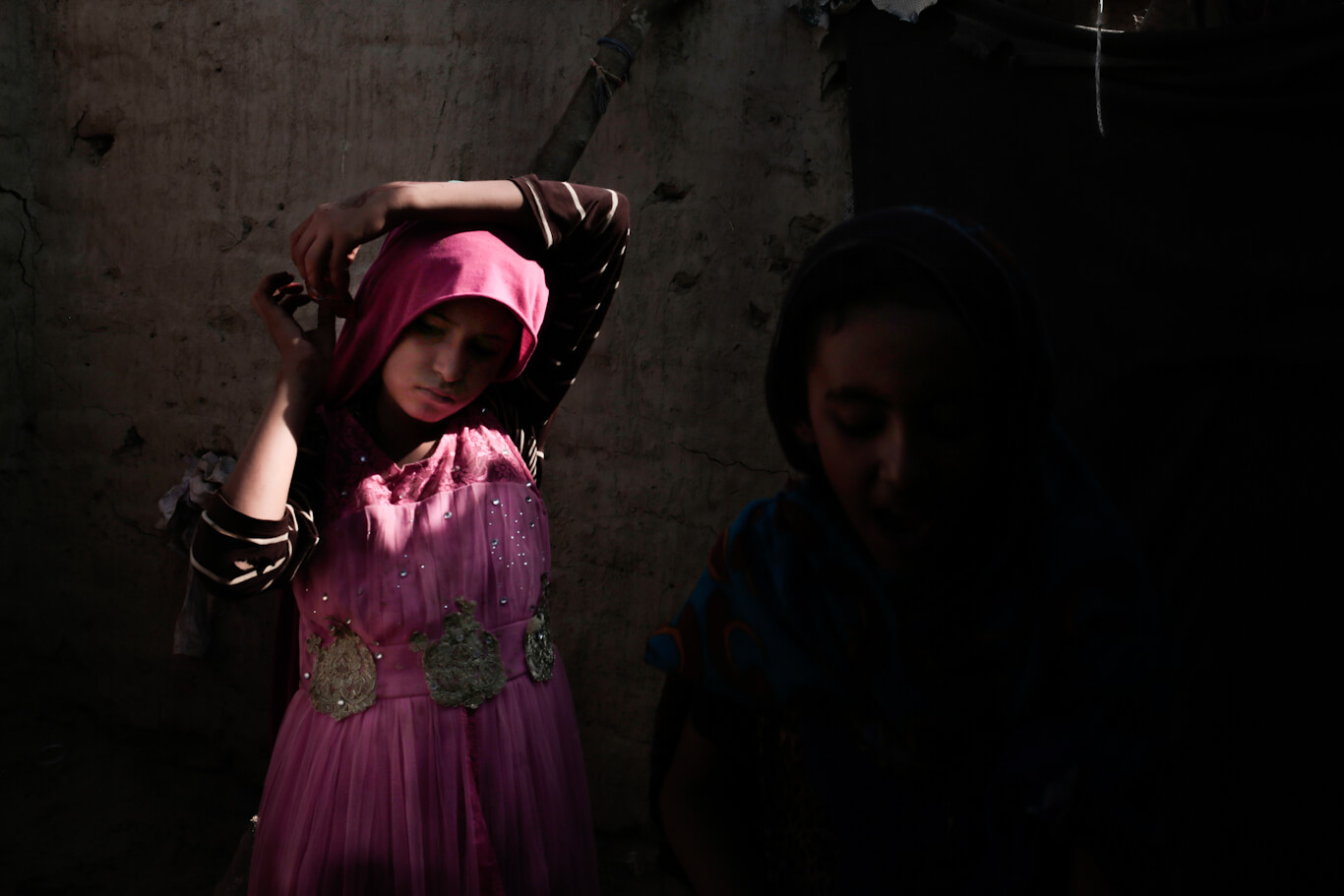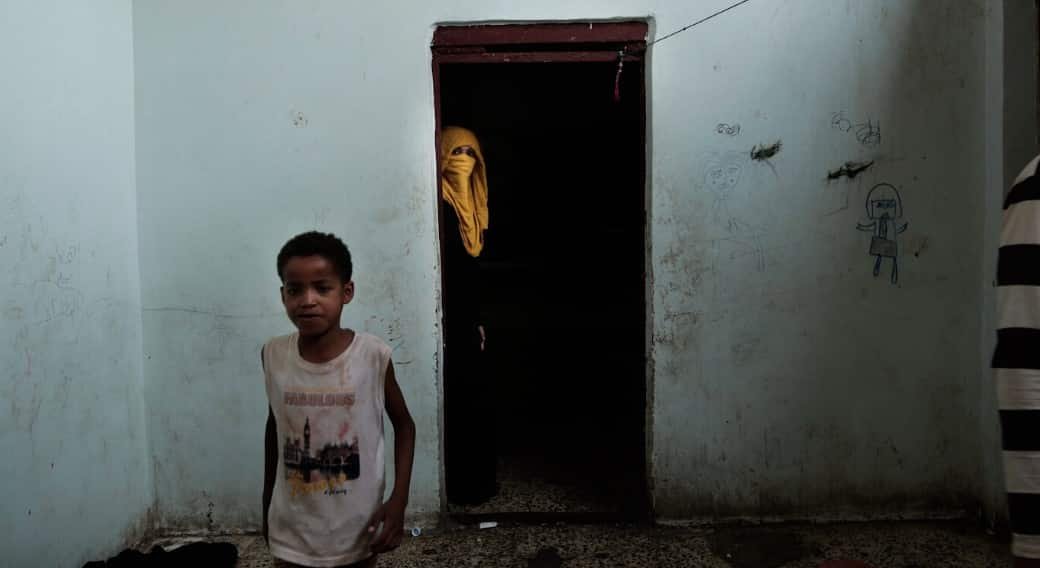By Ahmed Abdulkareem https://www.mintpressnews.com/human-trafficking-booming-yemen-war/261818/
AMRAN, YEMEN — The offensive war on Yemen, the most impoverished nation in the Middle East, was launched in 2015 by a U.S.-backed coalition of Arab countries led by Saudi Arabia, the richest nation in the Middle East. It has plunged a nation already struggling to provide basic services to its citizens into chaos, a nation now ruled by a ragtag consortium of different groups all thirsting for power.
The result? A complete absence of law and order in Yemen has given rise to a black Suq (market) of human trafficking on a scale never before seen in the war-torn and war-weary nation.
Thirty-five-year-old Tawfiq hails from Amran, a small city in west-central Yemen famous for its ancient mud-brick high-rises dating back two millennia to the Sabean kingdom. Tawfiq was among 17 Yemeni victims of human trafficking who agreed to speak to MintPress about their harrowing ordeals. In 2016, Tawfiq — desperate to bring money home to his family, as the then-fledgling war decimated the already shaky Yemeni economy — was told by a friend that he could earn as much as $7,000 for one of his kidneys. Days later Tawfiq was on a bus to Saudi Arabia, traveling through al-Wadeeah port on the Yemen-Saudi border.
Today, Tawfiq suffers from complications arising from his kidney extraction and is now unable to carry heavy objects. He told MintPress, “I thought that removing a kidney would be a simple arrangement, but now I live in a hell of pain and suffering.” Tawfiq’s operation was crude and involved no follow-up care.
Ismail, the owner of a small electronics store in Taiz, told MintPress, as he pointed to the place where one of his kidneys use to reside, “I needed money to feed my children.” Ismail hesitated while he recounted his story, worried that the shame of what he had done would reach his family. Yet thousands of Yemeni civilians who are living in abject poverty as a result of the ongoing war are willing to allow a part of themselves to be cut out and sold in order to be able to sustain their families.
Ali al-Jailai, head of the Yemen Organisation for Combating Human Trafficking, told MintPress that the wave of famine that hit the country in 2015, when the Saudi-led war began, has augmented Yemen’s human trafficking network and left women and children the most vulnerable.
“A while back there was a case of a man who was traveling to Egypt to sell his kidney,” al-Jailai told MintPress. “We talked to him and tried to persuade him not to go, but he refused; he needed the money.” With an economy now decimated by more than four years of war, many working-class Yemenis have abandoned hopes of working a normal job and instead turn to one of the few options that remain: to sign up for the fight against Saudi Arabia and the UAE, or to sell their organs to survive.
Over 20 million Yemenis are currently in need of humanitarian assistance, according to the United Nations. Salaries for teachers and other public-sector workers have not been paid regularly since the war began and Saudi Arabia seized control of Yemen’s Central Bank, leaving vulnerable populations at increased risk of falling victim to human trafficking.

A Yemeni boy looks back while laying on the ground as he begs for money in an alley of the old city of Sanaa, Yemen. Muhammed Muheisen | AP
The Yemen Organisation for Combating Human Trafficking, a Sana’a-based NGO, has documented over 10,000 cases of organ sales from the start of the war in March 2015 to 2017. According to the organization, actual figures could be much higher, as many cases go unreported owing to the illegality of the practice, religious concerns, and the associated stigma of the practice in Yemen’s conservative society.
Although he lost one of his kidneys, Tawfiq was lucky. Hundreds of Yemenis, including women and children, forced to “donate” their organs, lose their lives after their livers, kidneys, spleens, corneas, or even their hearts are removed. One Yemeni family recounted to MintPress, on condition of anonymity due to the sensitivity of the case, how they found their son after he went missing: “After his abduction we found his body thrown in the street, you could see there had been an operation on his body; we asked for an autopsy and were in shock after we found his heart was gone.”
Blockading a way out
In addition to poverty and the absence of law enforcement, there are other reasons why human trafficking flourishes in Yemen, perhaps the most prominent being the blockade levied against the country by the Saudi Coalition since 2015. Before the war, Yemenis would regularly leave the country to seek better health care, employment opportunities and safety abroad — including, somewhat ironically, in neighboring Saudi Arabia. Now — with seaports, airports, highways and especially the once-bustling Sana`a International Airport effectively shuttered by the Saudi Coalition — Yemenis are no longer able to flee the violence in their country or travel to neighboring wealthy Gulf countries for stints of work to earn some cash, leaving many with few options but to resort to selling their organs out of desperation to make ends meet.
The blockade has also left a large number of Yemenis stranded abroad, including some students and others who have managed to find a way out in hopes of receiving medical treatment. It is estimated, according to data provided by the Sana`a International Airport Media Center, that nearly 4 million Yemenis are currently stranded abroad. Many of the stranded are left in a state of legal limbo, unable to secure citizenship in neighboring countries and therefore unable to work, leaving them with no way to earn money short of begging on the street or agreeing to sell their organs

A Yemeni vendor sells coffee and in the old market in Najran, Saudi Arabia. Hasan Jamali | AP
The Yemen Organisation for Combating Human Trafficking told MintPress that many Yemenis who fled when the war broke out are now stuck abroad and that the organization has recorded as many as 300 cases of Yemenis stranded abroad selling their kidneys out of desperation.
Officials work with brokers and smugglers
Maha, who wished to be identified only by her first name, and her friend, who asked to remain anonymous, recounted how a Yemeni broker had managed to secure passports for them by contacting staff members at the Yemeni Consulate in Jeddah, Saudi Arabia, who then, together with a Saudi black-market organ dealer, created a formal medical report to make the sale of Maha and her friend’s kidneys look like a legitimate donor transplant. The Yemen Organisation for Combating Human Trafficking told MintPress that collusion by government officials is rampant in Egypt thanks to the large fees government employees charge for coordinating organ sales. “I used to travel to Egypt every month along with a group of girls where we would attend concerts at the Emirati Embassy; the trips were coordinated by high-level employees at the Yemeni Embassy,” Maha told MintPress.
Last year, Musa Al-Ezaki, the editor of Yemen’s widely-circulated Al-Hayat newspaper, made a very public offer to sell one of his kidneys to the highest bidder. Al-Ezaki coordinated with his brother, who was living in Egypt at the time, to place an ad in a Cario newspaper with the caption, “Under compelling circumstances I regret to announce the sale of my kidney to pay rent; if someone wants to buy a kidney, please call me.” It’s unknown if Al-Ezak ever found a buyer.
Yemen’s penal code calls for 10 years’ imprisonment for those engaged in human trafficking. However, not only are those laws not being implemented, government officials, especially those in the Aden-based government of Saudi-backed Abdrabbuh Mansur Hadi, are often directly involved in smuggling victims abroad and issuing permits to make the sale of organs appear as legitimate donations to recipients in countries that are supposed to require the approval of the Yemeni Embassy, especially Egypt.
“[In one case] we formally contacted embassy officials to coordinate with Egyptian authorities in order to return a human trafficking victim to Yemen, but they refused to respond,” al-Jailai told MintPress. “We have accurate information about the complicity of the Yemeni Embassy [staff] in Egypt and unfortunately, organized crime has been able to penetrate it.”
Owing to the collapse of an organized health care system in Yemen, organized criminal elements are smuggling victims to Egypt, the Saudi Arabia and China, according to the Yemen Organisation for Combating Human Trafficking. Yet, of the victims and brokers who spoke to MintPress, all indicated that Egypt is still one of the most favored destinations to which brokers and smugglers bring their victims.
MintPress interviewed three Yemeni brokers who said officials in Yemen were assisting them in obtaining travel documents for their victims and connecting them with brokers in Saudi Arabia and Egypt to arrange their travel, accommodation, and surgeries in direct coordination with staff in their countries’ embassies. “The government entities here [in Yemen] and in Saudi Arabia make bringing Yemenis abroad easy for us,” one of the brokers who asked to be identified as Abu Saiyad, which translates to The Hunter in English, told MintPress.
Organ brokers in Yemen do not work under the radar as their peers do in neighboring countries. They are known to most residents and wander through camps for the internally displaced and most major slums in large cities.
Harvesting prisoners of war
Owing to the increased demand for human organs, attributable in large part to the many troops who have sustained injuries while fighting in Yemen, Saudi Arabia and the UAE have also become a sizable market for Yemeni victims of human trafficking. Even some Yemeni prisoners of war captured on Yemeni battlefields have awoken to find their kidneys removed; others have had their organs harvested and been left for dead.
A number of families of prisoners of war said their loved ones had become victims of human trafficking after being captured on the front lines. They say Saudi Arabia has thus far refused to hand over their bodies. One such family told MintPress that they had evidence that the Saudi army extracted their son Ibrahim’s spleen and cornea from him before he was killed, but MintPress was unable to independently verify the claim.
In June 2019 the United States added Saudi Arabia to a list of countries it says are not doing enough to combat human trafficking. Instead, the U.S. said, the Kingdom has often jailed, fined or deported human trafficking victims, accusing them of immigration violations or prostitution rather than providing them assistance.
Despite the blacklisting of its Saudi ally, the United States is very much complicit in the human trafficking that has come to plague Yemen, according to many Yemenis, who feel that if the United States did not offer such generous support to the Coalition, their country would not be suffering a famine and hence no one would be forced to sell their organs, or their honor, to feed their children.
While Yemen’s penal code calls for 10 years’ imprisonment for those engaged in buying or selling human beings, the U.S. State Department has done nothing to publicly reprimand its coalition allies for failing to tackle trafficking in Yemen — this despite the fact the U.S.’ own report lays much of the blame at the feet of the Coalition-backed government in Aden.
Yemen’s women and girls at risk
The trafficking of human beings involves not only human organs but also sexual exploitation, and Yemen is no exception. Trafficked Yemeni women are subjected to rape, violence, extreme cruelty, and many other forms of pressure and coercion. Female trafficking victims who spoke to MintPress reported being forced into prostitution networks in Saudi Arabia and the Emiratis.

A displaced girl stands in her shelter in Abyan, Yemen, Feb. 9, 2018. Nariman El-Mofty | AP
One victim, who wished to be identified only as Samerah, told MintPress:
I traveled to Egypt in February 2018. I was taken to a party featuring the Saudi Ambassador and the head of the military police in Saudi Arabia by a Yemeni and Egyptian woman. That night I was forced into having sex and the next day I was given money and returned to the embassy.”
Another trafficking victim who was forced into sex work and who refused to be identified spoke to MintPress from a rehabilitation center run by the Houthis in Sana`a. She told MintPress that she is afraid to return to her home for fear of being killed for violating her family’s honor.
Wealthy Saudi and Emirati patrons often rely on professional brokers’ networks that send trafficked women and girls to hotels in Ethiopia, Djibouti, Egypt and Dubai in exchange for a commission, according to a number of testimonies given to MintPress by both trafficked victims and brokers.
Before the war, Saudi Arabia was already using Yemen as a hub for so-called “marriage tourism.” Saudi soldiers, businessmen, and ordinary citizens would travel to Yemen to marry young girls from poor families. Many of these girls would travel back to Saudi Arabia only to be used temporarily for sex and then simply or abandoned on the streets or sold to traffickers.
Even those who voluntarily seek to sell their organs out of desperation fall victim to smugglers and brokers. Aisha, who agreed to sell her kidney to a wealthy Bahraini woman told MintPress that the woman buying her kidney told her that she had paid $30,000 for it. Aisha received only $5,000.
Feature photo | People walk in a shelter for displaced persons in Ibb, Yemen, in this Aug. 3, 2018, photo. Nariman El-Mofty | AP
Ahmed AbdulKareem is a Yemeni journalist. He covers the war in Yemen for MintPress News as well as local Yemeni media.
ATTENTION READERS
We See The World From All Sides and Want YOU To Be Fully InformedIn fact, intentional disinformation is a disgraceful scourge in media today. So to assuage any possible errant incorrect information posted herein, we strongly encourage you to seek corroboration from other non-VT sources before forming an educated opinion.
About VT - Policies & Disclosures - Comment Policy





Some people wonder why we are involved in Yemen. The USSR’s implosion showed it clearly. Wherever chaos reigns, cockroaches thrive. Organ harvesting adds a profitable dimension.
Comments are closed.